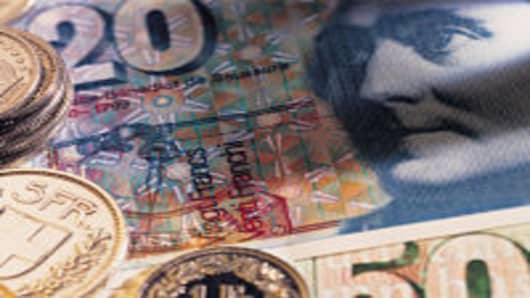The Swiss National Bank (SNB) came out fighting Tuesday, announcing its intention toset a minimum exchange rate for the Swiss franc against the euro, in a move which sent European shares and the price of gold down.
The move signaled the central bank's determination to devalue the franc, which has soared against the euro in recent months as investors look for safe havens. The FTSEurofirst 300 rose Tuesday morning following the announcement, but was down again by lunchtime.
Swiss policymakers and businesses have expressed mounting concerns over how the strengthening currency will affect Switzerland's export-based economy.
Both the Bank of Japanand the People's Bank of China have taken steps to devalue their currencies recently.
The Swiss move is larger than these relative to the size of its economy, Jennifer McKeown, senior European economist at Capital Economics, told CNBC.com.
The statement from the bank certainly took no prisoners.
"With immediate effect, it will no longer tolerate a EUR/CHF exchange rate below the minimum rate of CHF 1.20," it said. "The SNB will enforce this minimum rate with the utmost determination and is prepared to buy foreign currency in unlimited quantities."
"It needs to be aggressive to turn the tide for the Swissie and to take the shine off its safe haven status. So, this is an endurance contest whereby the SNB needs to fight hard against a market that could soon test its resolve," Paul Mackel, senior FX strategist and head of Asian currency research at HSBC, wrote in a note.
The effects of the SNB's action on gold, another safe haven of choice, were under discussion.
While the price of the precious metal initially declined on the news, before ticking up again, Smith believes that it will eventually become even more "the safe haven of choice."
Dennis Gartman, author of The Gartman Letter, told CNBC that the US dollar will become a more attractive safe haven in the light of the SNB move.
"The Swiss franc is no longer the safe haven it was until just recently," he said.
"Where else can you go but the US dollar? You can't effectively do the same size of trades in the Australian, New Zealand and Canadian dollars."
The SNB has plenty of capacity to continue buying euros.
"It can go on and on doing this for as long as it wants," said McKeown, who thinks the action will last until at least the end of 2011.
There are concerns that it is effectively providing an artificially low exchange rate for investors looking for safe havens from the peripheral euro zone economies.
"Rather than recycle these funds back into the markets they came from, the money will instead be invested into French and German debt," Simon Derrick, chief currency strategist at BNY Mellon, wrote in a note.
"In other words, the money continues to flow from the south to the north of the continent (albeit by a slightly indirect route)…it also suggests a less than wholehearted belief by the SNB in the outlook for the more peripheral Eurozone nations."
There are concerns about how far inflation in Switzerland would rise following the announcement. The last time the SNB carried out a similar measure, in October 1978 when a floor for the now-defunct deutschmark against the franc was introduced, inflation soared, peaking at over 7 percent in 1981. The Swiss abandoned the policy in 1982.
"In the medium to long term, they're going to have to worry about inflationary implications," said McKeown
The immediate effect on the yen, another currency viewed as a safe haven, was to send it down against the dollar.
"The market is not thinking that this will position the yen as the safe haven of choice - the Japanese currency was the only other major weaker vs. the dollar in the wake of the SNB announcement," Simon Smith, chief economist at FXPro, wrote in a research note.
"It would not be that surprising to see the MoF/BoJ jump on the bandwagon of the downdraft in safe havens caused by the Swiss move to sell some more yen, which would also drive home the message that the SNB should not be viewed as a soft touch now that the central bank has come out with all guns blazing."
Ultimately, the SNB cannot control what happens to the economy in the rest of the world.
"If the Swiss go down the same path as before, their concern over the CHF will not truly dissipate until the world outside Switzerland looks like a better place," said Mackel.





